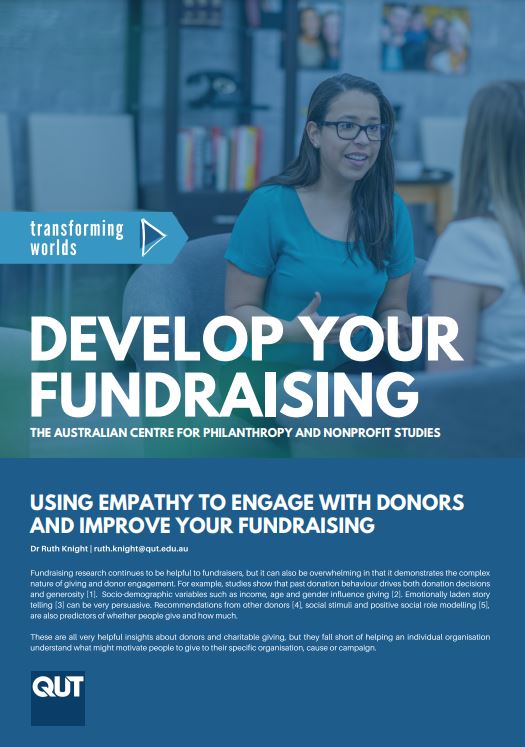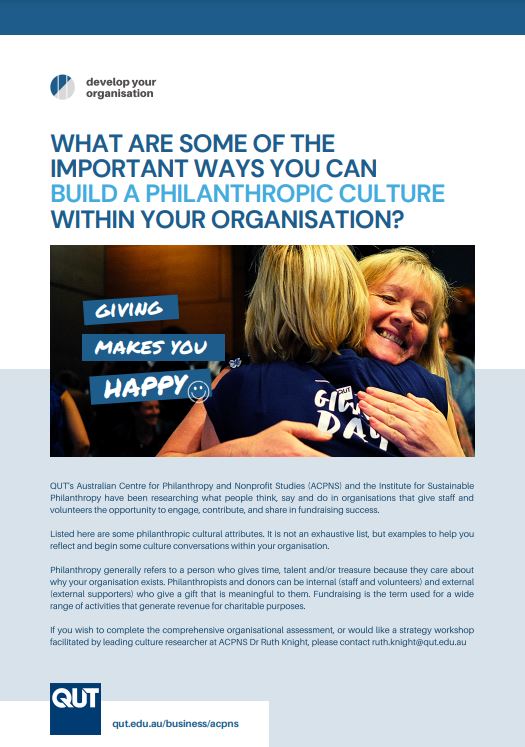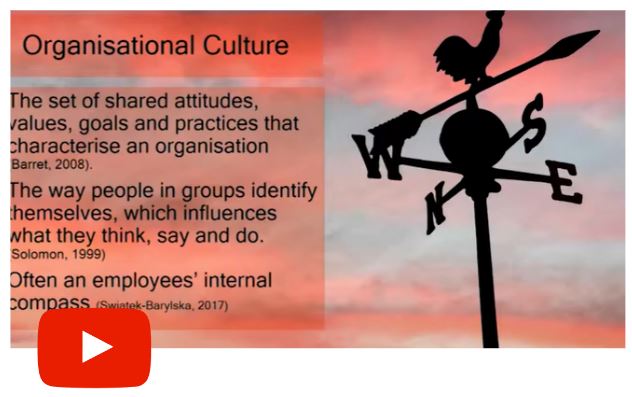What is a philanthropic culture?
Philanthropic culture is the way people think and talk about giving, philanthropy and fundraising within an organisation. The principles that support this culture include believing everyone in the organisation’s community (not just fundraisers) have a role and responsibility to tell the organisation’s story – to engage donors, contribute personally to back belief in the organisation’s work, and to share examples of need and the impact that occurs when people give. This culture values the health and wellbeing of donors and everyone is involved in providing great donor experiences, showing appreciation to donors, and celebrating the role they play in achieving the organisation’s purpose and goals.
Organisational culture is influenced most heavily by leadership, and philanthropic culture is no different. You cannot have a culture of philanthropy if leadership does not understand it and is not committed to it. That is why this culture is observed most prominently in organisations that invest in supporting all leaders, including the Board, to understand ethical fundraising principles, and how their role and decisions impact on attaining fundraising success. When leaders learn that it is not about making everyone into a frontline fundraiser, but rather about everyone being an ambassador for philanthropy and fund development, the culture starts to shift. Staff, volunteers, beneficiaries, and donors recognise it whenever they connect with the organisation because the conversations are donor-centric, and people are working collaboratively and creatively to find ways to share new stories and make decisions that are aligned with the organisation’s philanthropic goals to achieve their impact in the community.
A culture of philanthropy means that everyone accepts and celebrates the beauty of philanthropy and donors, no matter the type or size of the gift.
Simone Joyaux, Author of Strategic Fund Development. Building Profitable Relationships That Last
How can a philanthropic culture help organisations?
Developing a philanthropic culture involves providing tools for non-fundraising staff to be able to engage with donors and empowering them to be good storytellers. This increases their confidence to be more effective advocates for the organisation and can “open up fundraising opportunities and donor engagements that you didn’t have access to before”.
But the benefits are more far-reaching than just increasing revenue.
The report Beyond Fundraising. What Does it Mean to Build a Culture of Philanthropy? suggests that organisations with a culture of philanthropy are more likely to “strengthen trust, cooperation and engagement among board and staff members; and align mission and program goals more seamlessly with revenue generation”.
As we move into 2023, after the past few years of uncertainty and change, a strong and positive organisational culture is critical to ensure everyone throughout an organisation is feeling energised and has a shared vision about how to improve fundraising performance. Does your organisation have a culture of philanthropy?
The ACPNS survey
The ACPNS survey is particularly useful for Board members, nonprofit leaders and fundraisers. If you would like to assess your own culture, you can take the 10-minute survey .
Use ACPNS’s free handouts to discuss philanthropic culture with your team. For more information contact Dr Ruth Knight ruth.knight@qut.edu.au.
Handbook of Research Methods for Organisational Culture
QUT Short Course
Strategic Leadership and Governance in Social Purpose Organisations
Leadership is often seen as a complex skill, but with the right tools you can quickly become a confident and self-aware leader, with the skills and knowledge to improve organisational performance and social impact.
It will help you improve your personal and organisational performance; increase your confidence and give you practical strategies to help you model strategic leadership and governance. We encourage at least two people from your organisation to attend together, however individuals are also encouraged to register.
Past events
Tea & Buns flashback | Can organisational culture enhance fundraising results?
In a past Tea and Buns, Dr Ruth Knight and Dr Kathleen Chell from ACPNS discussed the link between organisational culture and fundraising results – and it was one of the most talked about sessions of the year! Take a look back and hear some case studies of organisations that have taken steps to influence the way that people think and speak about fundraising and philanthropy.
This is a great session if you want to:
- know what might be hurting your fundraising results
- hear what it means to have a philanthropic culture
- learn how to assess your culture
This session is useful for all nonprofit leaders and staff, not just fundraisers.
What is Tea and Buns?
Tea & Buns aims to create an opportunity for those working in nonprofit and social innovation to learn from each other, discuss the latest research and how we might apply research to our work. The webinar is online, free and gives you access to a vibrant network of like-minded people, including researchers at QUT. Each month we will tackle topical leadership questions.
Find out more and register for upcoming seminars
FIA/ACPNS Alumni Anniversary Breakfast | Eating Culture for Breakfast
‘Culture eats strategy for breakfast’ is a quote often attributed to Peter Drucker. At the 2019 FIA/ACPNS Alumni Anniversary Breakfast, a panel of experts discussed the power of creating an internal philanthropic culture; provided indicators of success; and explored how you can use this culture to enhance your fundraising results and improve your organisation’s sustainability.






